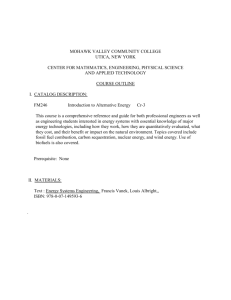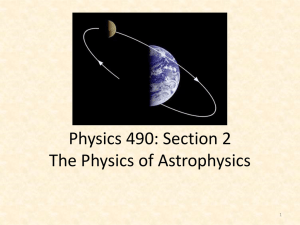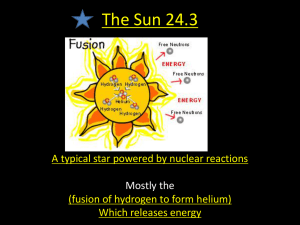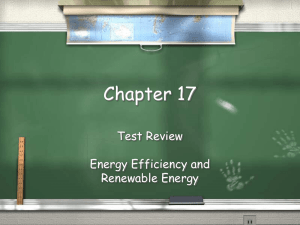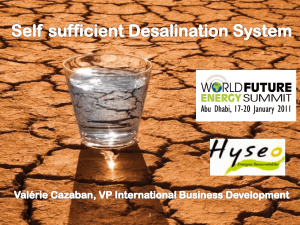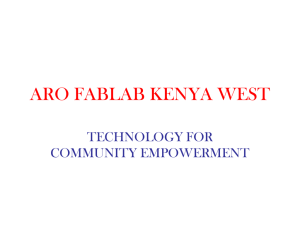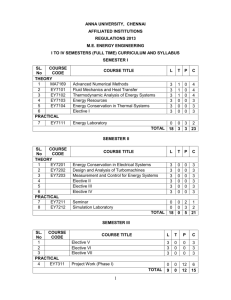ESE1001 – Introduction to Energy Systems Engineering
advertisement
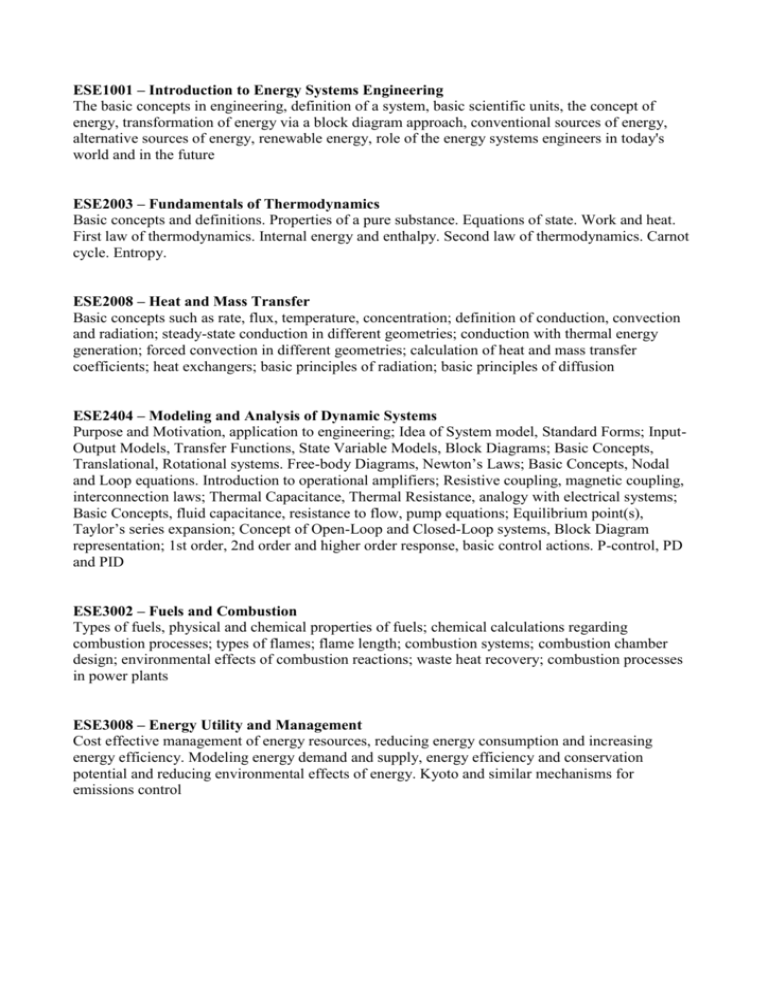
ESE1001 – Introduction to Energy Systems Engineering The basic concepts in engineering, definition of a system, basic scientific units, the concept of energy, transformation of energy via a block diagram approach, conventional sources of energy, alternative sources of energy, renewable energy, role of the energy systems engineers in today's world and in the future ESE2003 – Fundamentals of Thermodynamics Basic concepts and definitions. Properties of a pure substance. Equations of state. Work and heat. First law of thermodynamics. Internal energy and enthalpy. Second law of thermodynamics. Carnot cycle. Entropy. ESE2008 – Heat and Mass Transfer Basic concepts such as rate, flux, temperature, concentration; definition of conduction, convection and radiation; steady-state conduction in different geometries; conduction with thermal energy generation; forced convection in different geometries; calculation of heat and mass transfer coefficients; heat exchangers; basic principles of radiation; basic principles of diffusion ESE2404 – Modeling and Analysis of Dynamic Systems Purpose and Motivation, application to engineering; Idea of System model, Standard Forms; InputOutput Models, Transfer Functions, State Variable Models, Block Diagrams; Basic Concepts, Translational, Rotational systems. Free-body Diagrams, Newton’s Laws; Basic Concepts, Nodal and Loop equations. Introduction to operational amplifiers; Resistive coupling, magnetic coupling, interconnection laws; Thermal Capacitance, Thermal Resistance, analogy with electrical systems; Basic Concepts, fluid capacitance, resistance to flow, pump equations; Equilibrium point(s), Taylor’s series expansion; Concept of Open-Loop and Closed-Loop systems, Block Diagram representation; 1st order, 2nd order and higher order response, basic control actions. P-control, PD and PID ESE3002 – Fuels and Combustion Types of fuels, physical and chemical properties of fuels; chemical calculations regarding combustion processes; types of flames; flame length; combustion systems; combustion chamber design; environmental effects of combustion reactions; waste heat recovery; combustion processes in power plants ESE3008 – Energy Utility and Management Cost effective management of energy resources, reducing energy consumption and increasing energy efficiency. Modeling energy demand and supply, energy efficiency and conservation potential and reducing environmental effects of energy. Kyoto and similar mechanisms for emissions control ESE3101 – Alternative and Renewable Energy Systems I Differences between conventional and renewable energy technologies; solar energy; photovoltaic solar cells; active and passive solar heating systems; wind energy; design fundamentals of wind turbines; economic analysis of wind energy; geothermal energy; tidal energy; wave energy ESE3102 – Alternative and Renewable Energy Systems II Hydrogen production, hydrogen storage methods, energy production via biomass, basics of electrochemistry, Nernst equation, fuel cells ESE3402 – Power System Fundamentals Introduction, Definition of Power Terms, Three Phase Circuits, Transformers, Three-Phase Transformers, Synchronous Machines, Transmission Line Modelling, Power Flow Analysis, and Fault Analysis ESE3995 – Summer Training I Minimum four weeks (20 working days) of practical work in an organization with a sizable energy operation. Special attention should be given to most but not necessarily all of the following subjects: production, operation, maintenance, management and safety. A formal report as described in the Summer Practice Guide is to be submitted. ESE4002 – Hydrogen Energy Evaluation of energy technologies and their implementation within developing countries, develops an energy strategy, hydrogen research has included design, optimization, and simulation of standalone renewable hydrogen energy systems ESE4003 – Nuclear Energy Radioactive decay, nuclear reactions, binding energy, neutron intereactions, fission, nuclear reactors, neutron fission and moderation. Fick's law, nuclear reactor theory, neutron diffusion and moderation, thermal reactors, reflected reactors ESE4005 – Fuel Cell Technology Types of fuel cells, their advantages, connecting cells in series, efficiency and fuel cell voltage, the effect of pressure and gas concentration, proton exchange membrane fuel cells, alkaline electrolyte fuel cells, applications of fuel cells ESE4007 – Solar Energy This course is designed for undergraduate students from engineering disciplines and is intended to educate students in the design and applications of solar energy technology. It will focus on fundamentals of solar energy conversion, solar cells, optical engineering, photoelectrochemical cells, thermoelectric generators, and energy storage and distribution systems. The course covers solar energy insulation and global energy needs, current trends in photovoltaic energy engineering, solar cell material science, design and installation of solar panels for residential and industrial applications and connections to the national grid and cost analysis of the overall system. In addition, basic manufacturing processes for the production of solar panels, environmental impacts, and the related system engineering aspects will be included to provide a comprehensive state-of-the art approach to solar energy utilization. ESE4008 – Wind Energy Engineering aspects of wind power systems including mechanical design, support structure design, aerodynamic analysis, system concepts and analysis, economics and cost analysis, conversion to electric and other forms of energy ESE4011 – Energy Economics Understanding of energy economics through an exposure to the practical analytical skills of energy economics as well as to planning approaches that take into account the cost of environmental impacts. Interrelationships between energy, economics and the environment, as well as some important issues in energy policy. ESE4101 – Sustainable Energy Wide aspects of energy use from the viewpoints of sustainability, resource availability, technical performance, environmental effects, and economics. The course shows the tools to make “informed energy choices” and review the technology, environmental impacts and economics of main energy sources like nuclear, solar, wind, geothermal energies and hydropower. Covers the relationships between the development of technology, energy resources, and energy technologies available today ESE4102 – Energy Efficiency in Buildings Building envelope, space conditioning, calculation of heat losses through external surfaces, insulation, HVAC systems, central heating systems, lighting, water and fuel consumption in buildings, contribution of electrical appliances to energy consumption in buildings, related national and international standards and regulations ESE4301 – International Energy Market Dynamics Historical perspectives on the evolution of oil, gas and coal markets, global energy dynamics, Turkey's position in the energy markets ESE4402 – Power Plant Engineering Fundamentals of Power Plants, Energy Resources and Utilization, Variable Load, Steam Power Plants, Fuels used in Steam Power Plants, Diesel Power Plants, Gas Turbine Power Plants, HydroElectric Power Plants, Nuclear Power Plants, Solar Power and Wind Power ESE4420 – Power Transmission and Distribution Introduction to electrical power system, Electrical power distribution, Distribution transformers, Distribution equipments, Distribution Substations, Transmission System, Transmission Line Parameters. ESE4422 – High Voltage Techniques This course covers field analysis: experimental methods and applications. Electrical breakdown in gases, electrical breakdown of liquids, electrical breakdown of solid, insulation oils and solid dielectrics. Generation and measurement of high AC, DC, and impulse voltages and impulse currents: AC to DC conversion and electrostatic generators. Operation, design and construction of impulse generators. ESE4995 – Summer Training II Minimum four weeks (20 working days) of practical work in an organization with a sizable energy operation. Special attention should be given to most but not necessarily all of the following subjects: production, operation, maintenance, management and safety. A formal report as described in the Summer Practice Guide is to be submitted. ESE4997 – Capstone Project I Project topic selection, project proposal form preparation, work plan and outline preparation, literature survey, report writing ESE4998 – Capstone Project II Development and implementation of the method, obtaining the results, analyzing the results in terms of accuracy and precision, report writing, presentation preparation

